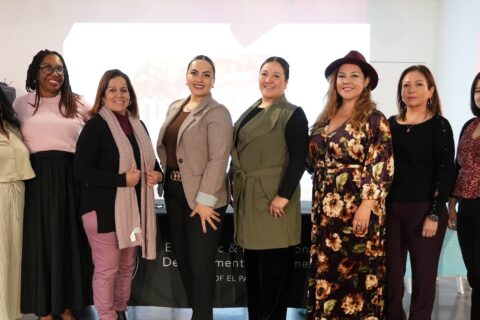Economic mobility is a cornerstone of strong communities nationwide by enabling residents the opportunity to strengthen their financial stability, security and build wealth. Cities focused on improving economic mobility for their residents not only improve the lives of their residents but also the community as a whole through a stronger municipal tax base, more robust local economy, and less strain on government services (PDF). While local leaders grapple with rising costs and increasing economic uncertainty — see our upcoming State of the Cities report for more details — a robust economic mobility strategy can support communities of all sizes, regions and demographics.
As part of NLC’s commitment to expanding economic mobility at the local level, through the generous support of the Gates Foundation, we have announced the 2025 cohort for the Advancing Economic Mobility Rapid Grant program.
- Antioch, CA
- Chelsea, MA
- East Providence, RI
- Evanston, IL
- Fort Lauderdale, FL
- Hamtramck, MI
- Houston, TX
- Kansas City, MO
- Philadelphia, PA
- Pinedale, WY
- Savannah, GA
- Young Harris, GA
Each of these municipalities will approach economic mobility in one of three strategy areas: creating quality employment opportunities, supporting local small businesses and connecting residents with essential public services and benefits.
Through the six-month engagement, the participating municipalities will receive grant funding, coaching from NLC staff, and peer learning engagements. As the 2025 cohort gets off the ground, we’re excited to share some of the successes from our 2024 cohort and what to expect from the newest rapid grant recipients.
For cities wanting to explore economic mobility as a policy, practice or procedure platform, use the three key economic mobility resources from our partners: Opportunity Insights’ Opportunity Atlas, Results for America’s Economic Mobility Catalog and the Urban Institute’s Upward Mobility Framework.
Creating Quality Employment Opportunities
In 2024, leveraging the much-needed rapid grant program funds to jumpstart their workforce development pilot, the City of Frederick, MD (pop. 78,171) enrolled eight participants into their Skill Accelerator and Digital Credentialing programs through specific partnerships with their local colleges. The courses ranged from child care certificate courses to a Certified Nursing Assistant (CNA) program. As a part of the city’s support, they removed financial barriers for course enrollment and provided case management for the CNA participants to guide them through the completion of the program and the start of their careers.
For the 2025 cohort, the City of Chelsea, MA (pop. 40,787) will provide subsidized workforce development training for at least 20 residents, culminating in job placements and internships after the six-month program. The City of Evanston, IL (pop. 78,110) will support the development of its Financial Empowerment Center staff by hiring and training local financial counselors and support staff to increase the impact of its one-on-one financial coaching services. The City of Houston, TX (pop. 2,304,580) will leverage its Mayor’s Office of Education & Youth Engagement (MOEYE) to expand workforce development programs for its opportunity youth year-round with a particular focus on jobs in the public sector. Finally, the City of Savannah, GA (pop. 147,780) aims to recruit and train high school students to receive scholarships and transportation support to earn professional certifications in the local childcare industry.
Learn more about NLC’s workforce development and economic opportunity portfolio.
Small Business Support
In 2024, using the rapid grant program award funds the City of Grand Island, NE (pop. 53,131) was able to meet a pressing community need to create the Grand Island Community Kitchen Pilot Project in which the city provided $2,000 in direct assistance to ten entrepreneurs who wanted to expand their food production businesses. In addition to the funding, the entrepreneurs attended four training courses at a local community college focusing on building their businesses, developing marketing plans and more.
As part of the 2025 cohort, the City of Antioch, CA (pop. 115,291) will coordinate and assist at least 10 collaborative small business projects with 30 local businesses and nonprofits and awarding up to $10,000 for two to four of the projects. The City of Fort Lauderdale, FL (pop. 182,760) will launch two, six-week entrepreneurial training program cohorts, each culminating in a matchmaking and pitch competition for $1,000 subawards. The City of Hamtramck, MI (pop. 28,433) will launch an Islamic-compliant small-dollar loan program to provide culturally appropriate interest-free capital for Muslim entrepreneurs who are unable to utilize traditional forms of capital due to religious reasons. The City of Kansas City, MO (pop. 508,090) plans on creating industry-specific regulatory checklists and education sessions for small businesses, entrepreneurial support organizations and other city departments to help them navigate the city’s permitting and compliance requirements in preparation for the 2026 FIFA World Cup. The Town of Pinedale, WY (pop. 2,005) will develop a centralized digital platform to help young entrepreneurs start their own businesses by streamlining the permitting and procurement processes.
Explore another small business support rapid grant success story: “3 Lessons Learned from the El Paso Women’s Entrepreneurship Accelerator.”
Connecting Residents to Benefits
In 2024, the City of South San Francisco, CA (pop. 66,105) hosted a series of community events to reach AAPI residents for their benefit navigation program, the Promotores. Through the seven events, the city staffers managed to reach more than 400 local AAPI community members with 100 of those directly connected to benefits navigation partners.
Through the 2025 cohort, the City of East Providence, RI (pop. 47,139) will utilize its funds to provide direct assistance and benefits connections (WIC, SNAP and LIHEAP, etc.) for approximately 150 residents in low-income areas. The City of Philadelphia, PA (pop. 1,603,797) plans on directing outreach strategies for its benefit enrollment tool to key low-income census tracts through direct home and high-school engagement. The smallest city in the cohort, the City of Young Harris, GA (pop. 1,098) will use the fund to provide financial literacy courses to two key local populations: Young Harris College students and residents of an income-restricted apartment complex.
NLC remains committed to supporting the breadth of strategies, policies and programs that local leaders can implement to advance the economic mobility of their communities. Beyond a monthlong focus on Economic Mobility & Opportunity (EMO), NLC will continue to share the successes of the 2025 Advancing Economic Mobility Rapid grant cohort and other economic mobility programs. Given the importance of economic mobility to the lives of all residents, NLC will continue to promote unique strategies, learnings, and resources for local leaders.
Learn more about tax time integration with benefits access.
Explore Municipal Financial Empowerment Strategies
Roughly, one in three Americans are financially insecure. Discover how local leaders are tackling financial instability through empowerment strategies. Explore key trends, themes and promising practices in “A Decade of Municipal Financial Empowerment Strategies: Findings from a 2024 Field Scan.”
















